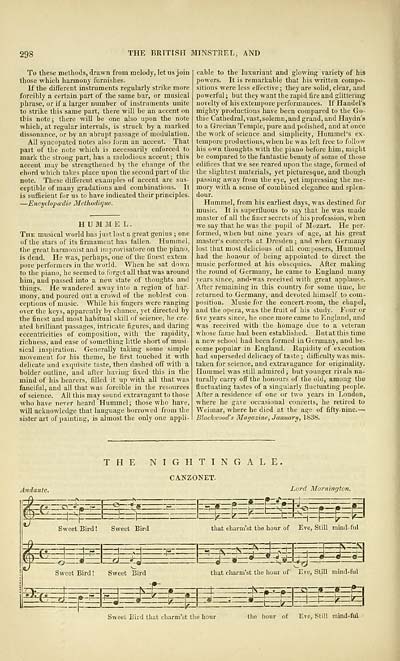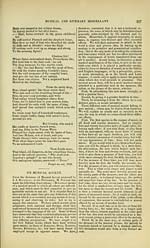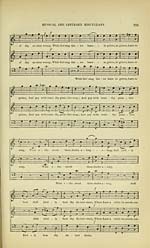Glen Collection of printed music > Printed music > British minstrel, and musical and literary miscellany
(306) Page 298 - Nightingale
Download files
Complete book:
Individual page:
Thumbnail gallery: Grid view | List view

298
THE BRITISH MINSTREL; AND
To these methods, drawn from melody, let us join
those which liarmouj furnishes.
If the difl'erent instruments regularly stride more
forcibly a certain part of the same bar, or musical
phrase, or if a larger number of instruments unite
to strike this same part, there will be an accent on
this note ; there will be one also upon the note
which, at regular intervals, is struck by a marked
dissonance, or by an abrupt passage of modulation.
All syncopated notes also form an accent. That
part of the note which is necessarily enforced to
mark the strong part, has a melodious accent; this
accent may be strengthened by the change of the
chord which takes place upon the second part of the
note. These ditTerent examples of accent are sus-
ceptible of many gradations and combinations. It
is sufficient for us to have indicated their principles.
— Encyclojiiedie Methoditjue.
HUMME L.
The musical worldhas just lost a great genius ; one
of the stars of its firmament has fallen. Hummel,
the great harmonist and iniprovisatore on the piano,
is dead. He was, perhaps, one of the (inest extern
pore performers in the world. When he sat down
to the piano, he seemed to forget all that was around
him, and passed into a new state of thoughts and
things. He wandered away into a region of har-
mony, and poured out a crowd of the noblest con-
ceptions of music. While his fingers were ranging
over the keys, apparently l)y chance, yet directed by
the finest and most habitual skill of science, he cre-
ated brilliant passages, intricate figures, and daring
eccentricities of composition, with the rapidity,
richness, and ease of something little short of musi-
sical inspiration. Generally taking some simple
movement for his theme, he first touched it with
delicate and exquisite taste, then dashed off' with a
bolder outline, and after having fixed this in the
mind of his hearers, filled it up with all that was
fanciful, and all that was forcible in the resources
of science. All this may sound extravagant to those
who have never heard Hummel; those who have,
will acknowledge that language borrowed from the
sister art of painting, is almost the only one appli-
cable to the luxuriant and glowing variety of his
powers. It is remarkable that his written compo-
sitions were less efi'ective ; they are solid, clear, and
powerful ; but they want the rapid fire and glittering
novelty of his extempore performances. If Handel's
mighty productions have been compared to tbe Go-
thic Cathedral,vast,solemn,and grand, and Haydn's
to a Grecian Temple, pure and polished, and at once
the work of science and simplicity, Hummel's ex-
tempore productions, when he was left free to follow
his own thoughts with the piano before him, might
be compared to the fantastic beauty of some of those
edifices that we see reared upon the stage, formed of
the slightest materials, yet picturesque, and though
passing away fi'om tbe eye, yet impressing the me-
mory with a sense of combined elegance and splen-
dour.
Hummel, from his earliest days, was destined for
music. It is superfluous to say that he was made
master of all the finer secrets of his profession, when
we say that he was the pupil of Mozart. He per-
formed, when but nine years of age, at his great
master's concerts at Dresden ; and when Germany
lost that most delicious of all composers. Hummel
had the honour of being appointed to direct tbe
music performed at his obsequies. After making
the round of Germany, he came to England many
years since, and-was received with great applause.
.4fter remaining in this country for some time, he
returned to Germany, and devoted himself to com-
position. Music for the concert-room, the chapel,
and the opera, was the fruit of his study. Four or
five years since, he once more came to England, and
was received with the homage due to a veteran
whose fame had been established. But at this time
a new school had been formed in Germany, and be-
come popular in England. Rapidity of execution
had superseded delicacy of taste ; difficulty was mis-
taken for science, and extravagance for originality.
Hummel was still admired ; but younger rivals na-
turally carry oft' the honours of the old, among the
fluctuating tastes of a singularly fluctuating people.
After a residence of one or two years in London,
where he gave occasional concerts, he retired to
Weimar, where he died at the age of fifty-nine. —
Blachvood's Magazine, Jamiarij, 1838.
THE NIGHTINGALE,
CANZONET.
Andante.
3;=^
1=^
i;p:
I—
-=t-#-
Lord Morningion.
:tE=t:
-t
1— I \r—'f—
I — \r-
Sweet Bird I Sweet Bird
that charm'st the hour of Eve, Still mind-ftd
I — \-ra
^e3=
:=t
izii
•-©■
Sweet Bird! Sweet Bird
-^-
:sn:
ttd:
that cliarm'st the Iiour of Eve, Still mind-ful
gj
Erzt;
i»-F-
f
rf=*
m
:p±:e=
:t— fc
35=^=iE=|?=|
:t:=^=fc
Sweet Bird that cliarm'st the hour
the hour of Eve, Still mind-ful
THE BRITISH MINSTREL; AND
To these methods, drawn from melody, let us join
those which liarmouj furnishes.
If the difl'erent instruments regularly stride more
forcibly a certain part of the same bar, or musical
phrase, or if a larger number of instruments unite
to strike this same part, there will be an accent on
this note ; there will be one also upon the note
which, at regular intervals, is struck by a marked
dissonance, or by an abrupt passage of modulation.
All syncopated notes also form an accent. That
part of the note which is necessarily enforced to
mark the strong part, has a melodious accent; this
accent may be strengthened by the change of the
chord which takes place upon the second part of the
note. These ditTerent examples of accent are sus-
ceptible of many gradations and combinations. It
is sufficient for us to have indicated their principles.
— Encyclojiiedie Methoditjue.
HUMME L.
The musical worldhas just lost a great genius ; one
of the stars of its firmament has fallen. Hummel,
the great harmonist and iniprovisatore on the piano,
is dead. He was, perhaps, one of the (inest extern
pore performers in the world. When he sat down
to the piano, he seemed to forget all that was around
him, and passed into a new state of thoughts and
things. He wandered away into a region of har-
mony, and poured out a crowd of the noblest con-
ceptions of music. While his fingers were ranging
over the keys, apparently l)y chance, yet directed by
the finest and most habitual skill of science, he cre-
ated brilliant passages, intricate figures, and daring
eccentricities of composition, with the rapidity,
richness, and ease of something little short of musi-
sical inspiration. Generally taking some simple
movement for his theme, he first touched it with
delicate and exquisite taste, then dashed off' with a
bolder outline, and after having fixed this in the
mind of his hearers, filled it up with all that was
fanciful, and all that was forcible in the resources
of science. All this may sound extravagant to those
who have never heard Hummel; those who have,
will acknowledge that language borrowed from the
sister art of painting, is almost the only one appli-
cable to the luxuriant and glowing variety of his
powers. It is remarkable that his written compo-
sitions were less efi'ective ; they are solid, clear, and
powerful ; but they want the rapid fire and glittering
novelty of his extempore performances. If Handel's
mighty productions have been compared to tbe Go-
thic Cathedral,vast,solemn,and grand, and Haydn's
to a Grecian Temple, pure and polished, and at once
the work of science and simplicity, Hummel's ex-
tempore productions, when he was left free to follow
his own thoughts with the piano before him, might
be compared to the fantastic beauty of some of those
edifices that we see reared upon the stage, formed of
the slightest materials, yet picturesque, and though
passing away fi'om tbe eye, yet impressing the me-
mory with a sense of combined elegance and splen-
dour.
Hummel, from his earliest days, was destined for
music. It is superfluous to say that he was made
master of all the finer secrets of his profession, when
we say that he was the pupil of Mozart. He per-
formed, when but nine years of age, at his great
master's concerts at Dresden ; and when Germany
lost that most delicious of all composers. Hummel
had the honour of being appointed to direct tbe
music performed at his obsequies. After making
the round of Germany, he came to England many
years since, and-was received with great applause.
.4fter remaining in this country for some time, he
returned to Germany, and devoted himself to com-
position. Music for the concert-room, the chapel,
and the opera, was the fruit of his study. Four or
five years since, he once more came to England, and
was received with the homage due to a veteran
whose fame had been established. But at this time
a new school had been formed in Germany, and be-
come popular in England. Rapidity of execution
had superseded delicacy of taste ; difficulty was mis-
taken for science, and extravagance for originality.
Hummel was still admired ; but younger rivals na-
turally carry oft' the honours of the old, among the
fluctuating tastes of a singularly fluctuating people.
After a residence of one or two years in London,
where he gave occasional concerts, he retired to
Weimar, where he died at the age of fifty-nine. —
Blachvood's Magazine, Jamiarij, 1838.
THE NIGHTINGALE,
CANZONET.
Andante.
3;=^
1=^
i;p:
I—
-=t-#-
Lord Morningion.
:tE=t:
-t
1— I \r—'f—
I — \r-
Sweet Bird I Sweet Bird
that charm'st the hour of Eve, Still mind-ftd
I — \-ra
^e3=
:=t
izii
•-©■
Sweet Bird! Sweet Bird
-^-
:sn:
ttd:
that cliarm'st the Iiour of Eve, Still mind-ful
gj
Erzt;
i»-F-
f
rf=*
m
:p±:e=
:t— fc
35=^=iE=|?=|
:t:=^=fc
Sweet Bird that cliarm'st the hour
the hour of Eve, Still mind-ful
Set display mode to: Large image | Transcription
Images and transcriptions on this page, including medium image downloads, may be used under the Creative Commons Attribution 4.0 International Licence unless otherwise stated. ![]()
| Special collections of printed music > Glen Collection of printed music > Printed music > British minstrel, and musical and literary miscellany > (306) Page 298 - Nightingale |
|---|
| Permanent URL | https://digital.nls.uk/91438617 |
|---|
| Description | Scottish songs and music of the 18th and early 19th centuries, including music for the Highland bagpipe. These are selected items from the collection of John Glen (1833 to 1904). Also includes a few manuscripts, some treatises, and other books on the subject. |
|---|
| Description | The Glen Collection and the Inglis Collection represent mainly 18th and 19th century Scottish music, including Scottish songs. The collections of Berlioz and Verdi collected by bibliographer Cecil Hopkinson contain contemporary and later editions of the works of the two composers Berlioz and Verdi. |
|---|

